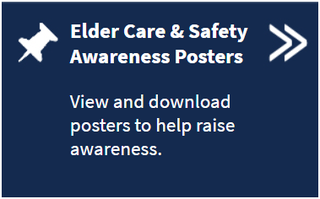Advocating for the Nation's Elder Population
OIG has a long history of protecting the health and well-being of HHS beneficiaries, including residents in long-term care facilities such as nursing homes, many of whom are seniors. As part of our commitment to this important work, our oversight agency collects and investigates tips and complaints about fraud, waste, and abuse in these facilities.
Unfortunately, during the COVID-19 pandemic, we have seen a spike in the number of reports of elder harm and neglect. Also, of great concern is the rise in the number of bad actors preying on unsuspecting individuals in our country, including many Medicare and Medicaid beneficiaries.
As we continue to aggressively investigate those who cheat our programs or hurt beneficiaries, we want you to know that the public can effectively advocate for this vulnerable population by reporting patient safety and fraud concerns. While there are many ways that long-term care residents can be subject to harm, here are a few:
Harm or Neglect
- If residents have bruises, fractures, lacerations, abrasions, contusions, or other bodily injuries, this may indicate potential physical abuse, sexual abuse, or neglect.
- Behavioral changes or non-verbal signals that a resident may be in fear of specific staff or caretakers. This may indicate possible abuse.
- Poor hygiene and sanitation practices and delays in transferring ill residents to hospitals can result from failures in quality of care.
- Employees who do not follow COVID-19 health and safety precautions demonstrate inadequate infection control measures and risk exposing residents and other staff to the virus.
Fraud
- Fraudsters visit facilities and offer medical services in exchange for Medicare and Medicaid numbers that are then submitted in fraudulent claims to insurers.
- Scammers reach residents via unsolicited telephone calls, television commercials, and internet pop-up ads attempting to obtain personal information and commit medical identity theft.
- Fraudulent health care providers and prescribers may provide medically unnecessary treatments and products to residents and bill for the illegitimate services.
Raise Awareness


Click the links below to download posters to help raise awareness.
Report Fraud, Abuse, and Neglect
- If a senior is not in urgent danger, but you suspect fraud, abuse, or neglect has or is occurring, please report your complaint to local law enforcement, state agencies, including your state Medicaid Fraud Control Unit (MFCU), or to HHS OIG at tips.hhs.gov.
- In addition, should you, or someone you know, be in urgent life threatening danger, please call 911 for an immediate response. Medical authorities can address the issue quickly and alert the proper authorities that a nursing home may be failing to keep residents safe.
- Medicaid Fraud Control Units (MFCU)
Learn about the role of State MFCUs in the investigation and prosecution of health care provider fraud and patient abuse or neglect in long-term care facilities and health care facilities.
Other Information
The Department of Health and Human Services Office of Inspector General has encountered a wide variety of scams that specifically target the elder population. From COVID-19 scams to Medical Identity Theft, OIG keeps the public informed about the latest scams and how you can protect yourself. Learn More
The Office of Evaluation and Inspections (OEI) conducts national evaluations of HHS programs from a broad, issue-based perspective. The evaluations incorporate practical recommendations and focus on preventing fraud, waste or abuse and encourage efficiency and effectiveness in HHS programs.
12-13-2023
09-06-2023
01-19-2023
11-14-2022
07-27-2021
06-22-2021
12-17-2020
09-22-2020
- States Continued To Fall Short in Meeting Required Timeframes for Investigating Nursing Home Complaints: 2016-2018
Report | Map
09-04-2020
08-03-2020
06-30-2020
07-13-2019
07-03-2019
07-30-2018
06-26-2018
09-28-2017
The Office of Audit Services (OAS) conducts independent audits of HHS programs and/or HHS grantees and contractors. These audits examine the performance of HHS programs and/or grantees in carrying out their responsibilities and provide independent assessments of HHS programs and operations. These audits help reduce waste, abuse, and mismanagement and promote economy and efficiency throughout HHS.
12-06-2023
09-18-2020
09-17-2020
08-19-2020
07-29-2020
03-13-2020
03-06-2020
02-06-2020
11-13-2019
08-20-2019
06-12-2019
The Office of Counsel to the Inspector General (OCIG), among other things, represents OIG in all civil and administrative fraud and abuse cases involving HHS programs, including False Claims Act, program exclusion, and civil monetary penalty cases. In connection with these cases, OCIG also negotiates and monitors corporate integrity agreements. Based on this work, OCIG has issued compliance program guidances. Below is a link to all current corporate integrity agreements, several of which are with nursing home providers, and a link to compliance program guidances, including guidance for nursing facilities.
Testimonies
11-14-2019
07-23-2019
09-06-2018
- "Examining Federal Efforts to Ensure Quality of Care and Resident Safety in Nursing Homes" Testimony
Videos
06-12-2019
06-07-2017
